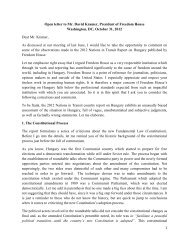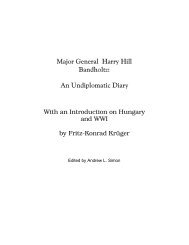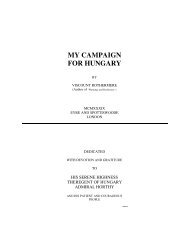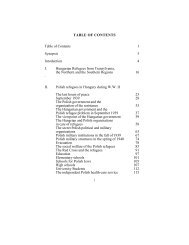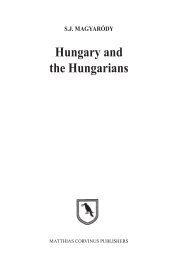The Fate of Western Hungary 1918-1921 - Corvinus Library ...
The Fate of Western Hungary 1918-1921 - Corvinus Library ...
The Fate of Western Hungary 1918-1921 - Corvinus Library ...
Create successful ePaper yourself
Turn your PDF publications into a flip-book with our unique Google optimized e-Paper software.
Points. Emphasizing that the German populated settlement <strong>of</strong> western<br />
Hungarian areas adjacent to Austria have the same right to self determination as<br />
all the other nationalities whose same right <strong>Hungary</strong> has already granted.<br />
In the meanwhile, with the tacit approval <strong>of</strong> the Viennese government, a<br />
large propaganda campaign was begun to win over the western Hungarian<br />
Germans and create a fait accompli whereby the settlements will petition for<br />
their transfer to Austrian hegemony. As one <strong>of</strong> the first events in this campaign,<br />
in the smallest, by population, ‘free royal city’ in <strong>Hungary</strong>, Ruszt (Rust), on the<br />
western shore <strong>of</strong> Lake Fertő, placards appeared on the city streets on November<br />
15, urging the population to join Austria.<br />
Even before this, on November 5, at a session <strong>of</strong> the interim German-<br />
Austrian National Assembly, Rep. Heilinger demanded that the minority-<br />
German populated counties <strong>of</strong> Moson, Sopron and Vas, as well as part <strong>of</strong><br />
Pozsony county, including the city <strong>of</strong> Pozsony, be annexed to German-Austria.<br />
<strong>The</strong> situation became more serious when a proposed law by the National<br />
Council, the November 14 “German-Austria’s territorial extent, borders and<br />
conditions” and a Declaration <strong>of</strong> State (Staatserklärung) were introduced before<br />
the National Assembly. <strong>The</strong> fifth item <strong>of</strong> the latter clearly states: “<strong>The</strong> blocks <strong>of</strong><br />
German populated settlements in the current counties under the Hungarian<br />
Crown that immediately border on German-Austria are to be annex to the state<br />
<strong>of</strong> German-Austria.” Rep. Heilinger went on to demand immediate military<br />
occupation <strong>of</strong> the four mentioned counties.<br />
<strong>The</strong> question was again on the agenda <strong>of</strong> the National Assembly’s<br />
November 17 session. On the very same day, the National Council, reacting to<br />
media reports from the western Hungarian counties, passed the following<br />
resolution: “1. <strong>The</strong> National Council assert that the German populated areas <strong>of</strong><br />
Pozsony, Moson, Sopron and Vas counties are part <strong>of</strong> German-Austria<br />
geographically, economically and ethnically, are in the most close economic<br />
and intellectual relationship with German-Austria for centuries past, and are<br />
indispensable for the feeding <strong>of</strong> Vienna. Hence, the German-Austria will do its<br />
utmost at the peace conference to be able to annex these territories. In this<br />
context, the National Council greets the vigorous national and economic<br />
annexation movement <strong>of</strong> the Germans <strong>of</strong> <strong>Western</strong> <strong>Hungary</strong>. 2. <strong>The</strong> Public Food<br />
Distribution Office is directed to send, as soon as possible, buying agents to<br />
western Hungarian counties, to ensure Vienna’s food supply.” 21<br />
In his November 22 speech to the National Assembly, President <strong>of</strong> the<br />
National Council Karl Renner stressed that they are trying to establish good<br />
relations with the Hungarian government and are desirous <strong>of</strong> signing an<br />
21 Harrer, Ferenc: Egy magyar polgár élete [<strong>The</strong> life <strong>of</strong> a Hungarian citizen]. Vol. I.<br />
Budapest, 1968, pp. 368–369. Ferenc Harrer (1874–1969) was the first ambassador <strong>of</strong><br />
the Károlyi government to Austria (Nov.-Dec. <strong>1918</strong>), then appointed as head <strong>of</strong> the<br />
newly constituted Hungarian Foreign Ministry and temporary Deputy Foreign Minister.<br />
In his memoirs, he analyzes the wester <strong>Hungary</strong> question and the Hungarian-Austrian<br />
relations. (pp. 357–379)<br />
14




